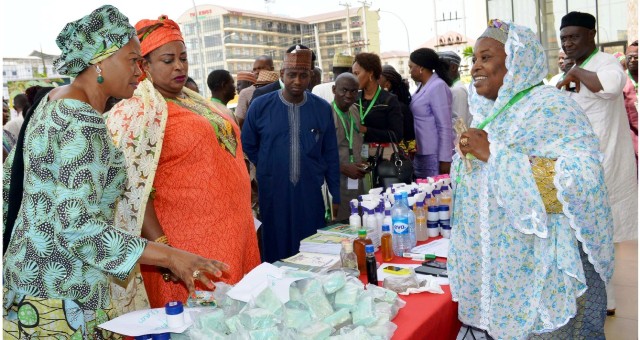Business
Recession: EU Advises Nigeria To Devalue Naira

A European Union (EU) official, Fillippo Amato, has advised the Federal Government to devalue the Naira as part of measures to tackle the economic recession.
Amato, who is also the counsellor and head of Trade and Economics Section of EU, made this known in an interview with newsmen, in Abuja.
The EU official said that recession could not be addressed with traditional development tools.
He said the recession was a recent development which was due to a number of factors, including the fall in oil prices and resurgence of militancy in the Niger Delta.
“To come out of recession, the country has to take brave decisions, regardless of how unpopular they may be such as fully and effectively devaluing the Naira.
“Devaluing the Naira is a measure, which will finally reassure investors and attract new capitals to the country.
“At the same time, it will further reduce imports, thereby removing artificial forex restrictions, and removing any potential waste of scarce resources such as the fuel subsidy.
“Improving security (in the North-East and Niger-Delta) and ease of doing business are also key factors on which the government must urgently work to re-launch the economy,’’ he said.
Amato said that EU had been at the forefront of aid for trade support activities in Nigeria and ECOWAS.
He said the most important programme the EU was implementing in Nigeria with its partners – GIZ, DFID/Adam Smith International and UNIDO – was the Nigeria competitiveness Support Programme.
“The programme aims at improving the quality of Nigeria products to comply with international standards.
“The programme is providing capacity building to several Ministries, Departments and Agencies such as Ministry of Agriculture, Standards Organisation of Nigeria, Consumer Protection Council, Nigerian Customs Services and NADFAC.
“We support the trade institutions in the formulation and implementation of a sound trade policy (support to the Federal Minister of Industry, Trade and Investment, and Nigerian Customs Service).
“This is to improve the business environment, with pilot projects in Kano and Kaduna to improve the procedures for obtaining land titles, and business licences,’’ he said.
He said Nigeria also needed to take advantage of the devaluation of its currency by diversifying its sources of foreign exchange revenue and this mainly through boosting its non-oil exports.
Amato said that EU would increase its support to the country under the Economic Partnership Agreement (EPA) if ratified.
“EPA aims at boosting industrialisation and sustainable development of West Africa, both through improved (predictable, transparent and long-term) trade relations and through a development cooperation component.
“In addition, on September 14, the EU has launched a European External Investment Plan which will further support private sector investments in the African continent, including Nigeria.
“The plan will support investments in the continent by providing targeted guarantees and ameliorating the investment climate and the overall policy environment in partner countries.
“The plan will be implemented through the new European Fund for Sustainable Development, with EU funds totalling €3.35billion until 2020.
“The EU Funds are expected to mobilise up to €44 billion additional investments,’’ the official said.
He, however, advised Nigeria to take into consideration all the opportunities the EPA would offer to Nigeria and communicate them to all interested stakeholders.
“The role of the government is also to reassure all stakeholders that there is no reason to be worried in the course of implementation of the EPA.
“The government will use all instruments offered by the EPA to ensure it will achieve its objective to promote industrialisation and development of Nigeria and West Africa.
“The EU will do its part to ensure these objectives are achieved,” he said.
According to him, in a globalised world no country or regional community can ignore the destiny of its neighbours.
“The EU, in particular, due to its historic ties and geographic proximity to West Africa, has a strong interest in promoting and supporting West Africa’s development, well-being, prosperity and stability.’’
Business
NCDMB, Dangote Refinery Unveil JTC On Deepening Local Content
Business
Food Security: NDDC Pays Counterpart Fund For LIFE-ND Project
Business
Replace Nipa Palms With Mangroove In Ogoni, Group Urges FG, HYPREP
-
Business2 days ago
PH Women Plan Alternative Stew, Shun Tomato High Prices
-
Foods/Drinks2 days ago
What To Know About Your Menu
-

 Niger Delta2 days ago
Niger Delta2 days agoEx-IYC President Lampoons Atiku’s Presidential Ambition … Declares It Negative Impact On N’Delta
-
News2 days ago
Tinubu Never Stopped 5-year Visa For U S. Citizens – Presidency ?
-

 Featured2 days ago
Featured2 days agoINEC To Unveil New Party Registration Portal As Applications Hit 129
-
Business2 days ago
Industry Leaders Defend Local Content, … Rally Behind NCDMB
-
Sports2 days ago
Nigerian Athletes Serving Doping Bans
-

 Niger Delta2 days ago
Niger Delta2 days agoC’River Focused On Youth Empowerment – Commissioner

